
When CSC first announced the RX1E, I was super excited about the prospect of an electric motorcycle that could hit highway speeds while priced at a fraction of most big name e-motos today. And so, when I was swinging through LA recently, I made sure to stop by CSC’s Azusa headquarters and give the bike a test. Now I’m even more excited than ever about this new addition to CSC’s lineup.
At just $8,495, the CSC RX1E comes in swinging with a very nice spec sheet at a reasonable price point. For comparison, you’d have to pay 50% more to get an entry level Zero electric motorcycle that has similar performance specs.
There’s a lot going on here. The bike has liquid cooling for the motor and controller, belt drive, ABS braking in the front and rear, included storage cases and bash bars, reverse gear, a windshield, both a center AND a side stand, and a good-sized glove box in the faux tank. Half of these are features you normally find on much higher priced motorcycles, and the other half are features you generally have to pay many hundreds of dollars extra for.
But the unassuming CSC RX1E gives you everything you’d ever need in an around-the-town motorcycle, all for a reasonable price.
Check out my first ride on the new bike in my video below, then keep reading for my complete thoughts on this new entry into the affordable electric motorcycle market.
CSC RX1E video review
CSC RX1E tech specs
- Motor: 8 kW continuous, 18 kW peak-rated swingarm-mounted motor
- Top speed: 80 mph (130 km/h)
- Max range: 112 mi (180 km)
- Battery: 96V 64Ah (6.16 kWh)
- Charge time: 6 hours on Level 1 (110VAC wall plug)
- Curb weight: 465 lb (211 kg)
- Brakes: Hydraulic disc brakes with Bosch ABS
- Extras: liquid-cooled motor and controller, belt drive, three included storage cases, included crash bars, LED and analog gauges, windshield, side and center stands, USB charging port on instrument panel
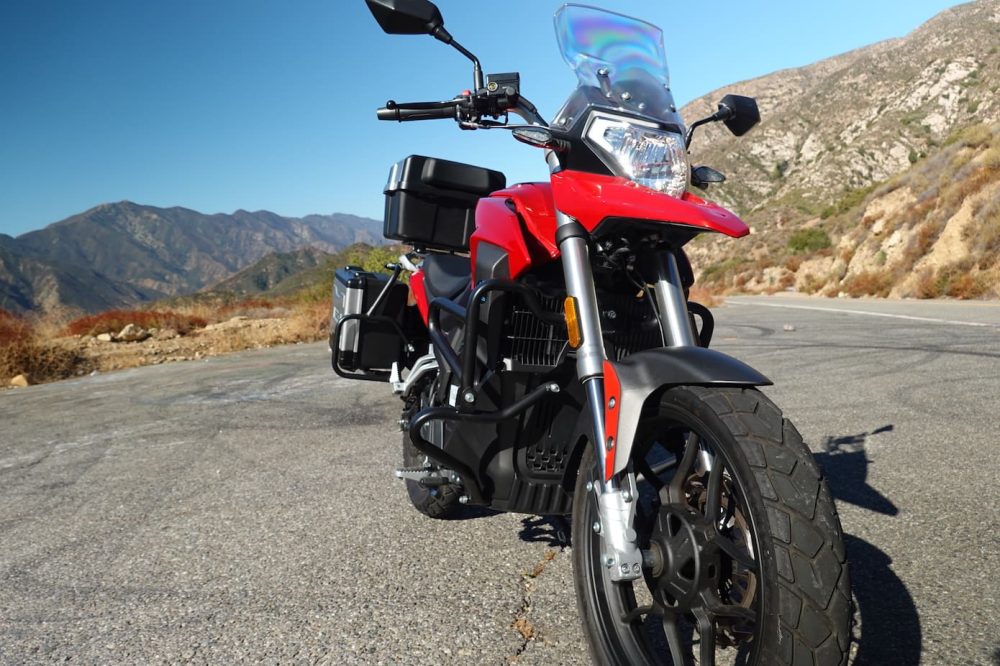
Adventure look, city utility
So the first thing you notice about the CSC RX1E is the adventure-style setup. It’s got an upright stance, big cargo boxes, a bash guard and a windshield. All of these tend to scream “safari”, not “city.”
But all of those features actually make it a great urban runabout, which is what the bike is primarily designed for. Sure, it’s got adventure styling and matches the look of CSC’s popular ICE-powered RX3 and RX4 adventure bikes. But this baby is more than likely going to be sticking to commuter duty for most riders.
And that’s where it will absolutely excel. The upright seating position and tall bars make it super comfortable. Your legs aren’t tucked up underneath your body, you’re not crouched forward and you aren’t hugging the tank. Instead, you’re sitting up tall with a good view of the road, holding onto reasonably high bars and planted solidly on a comfortable saddle.
The suspension is also great for a city, especially one that doesn’t have the best streets. I pulled into CSC’s showroom on a borrowed LiveWire One, which gave me a unique chance to do some of the same route on both bikes. The LiveWire blows the CSC RX1E out of the water when it comes to power, but the RX1E was much more comfortable to ride, especially on speed bumps and other road irregularities.

Those lockable storage boxes are also just as useful as they seem. I normally ride with a backpack to carry all of my camera and audio gear that I use on rides, plus a few extra pieces of gear (tools, rain poncho, emergency kit, etc). But with the tail box, I could fit everything inside with room to spare. I didn’t even crack open the side boxes, that’s how much room I had in the top box.
But if you’re doing grocery shopping, running errands or picking up a takeout order for the whole office, you could probably fit it all in those three cases. And anything else can be stuffed in the faux “tank”, which has its own glovebox.
For anyone who doesn’t like the look of the boxes, you can pull them off with just a few bolts. But considering that’s an expensive option on other bikes, and with all of that added utility, it’s frankly amazing that they come standard.
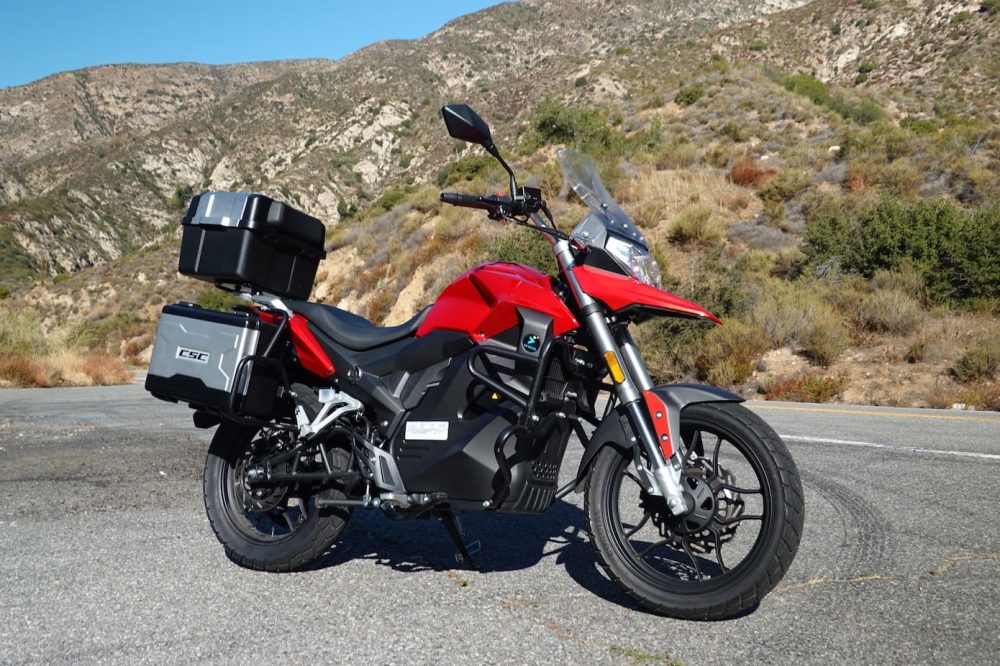
Respectable performance
I’d call the performance specs decent, especially for a city bike that can handle freeway jaunts. This isn’t a powerhouse, but Sport mode definitely has good pickup. The bike comes with a rated top speed of 80 mph (130 km/h), but one of the CSC mechanics told me they got it up to a GPS-verified 88 mph (143 km/h) on the freeway in a full tuck.
The 18 kW peak-rated motor has good acceleration, and it pulled me up canyon roads without a thought. Does it compare to an Energica or a LiveWire? Absolutely not. Those bikes will have you holding on for dear life. But again, that’s not the type of ride the CSC RX1E is designed for.
If you’ve ever ridden an Energica, Zero, or LiveWire, you’ll know that when you punch it, those bikes are simply gone. You’re down the road before you know what happened.
The CSC RX1E, on the other hand, has a more muted but actually quite comfortable throttle response. Even if you crank it full throttle from a dead stop, you get that first quarter to half a second of easy throttle ramping up to full power. It doesn’t dump it all at once like an on/off switch, which is quite rare among lower cost electric motorcycles. Low-cost electric motorcycles can sometimes be a bit more jerky, since good throttle ramping requires careful programming – something often overlooked on cheap motorcycles. But the RX1E really nails the throttle response for a comfortable profile that doesn’t leave you feeling lacking. It’s both responsive and comfortable at the same time.

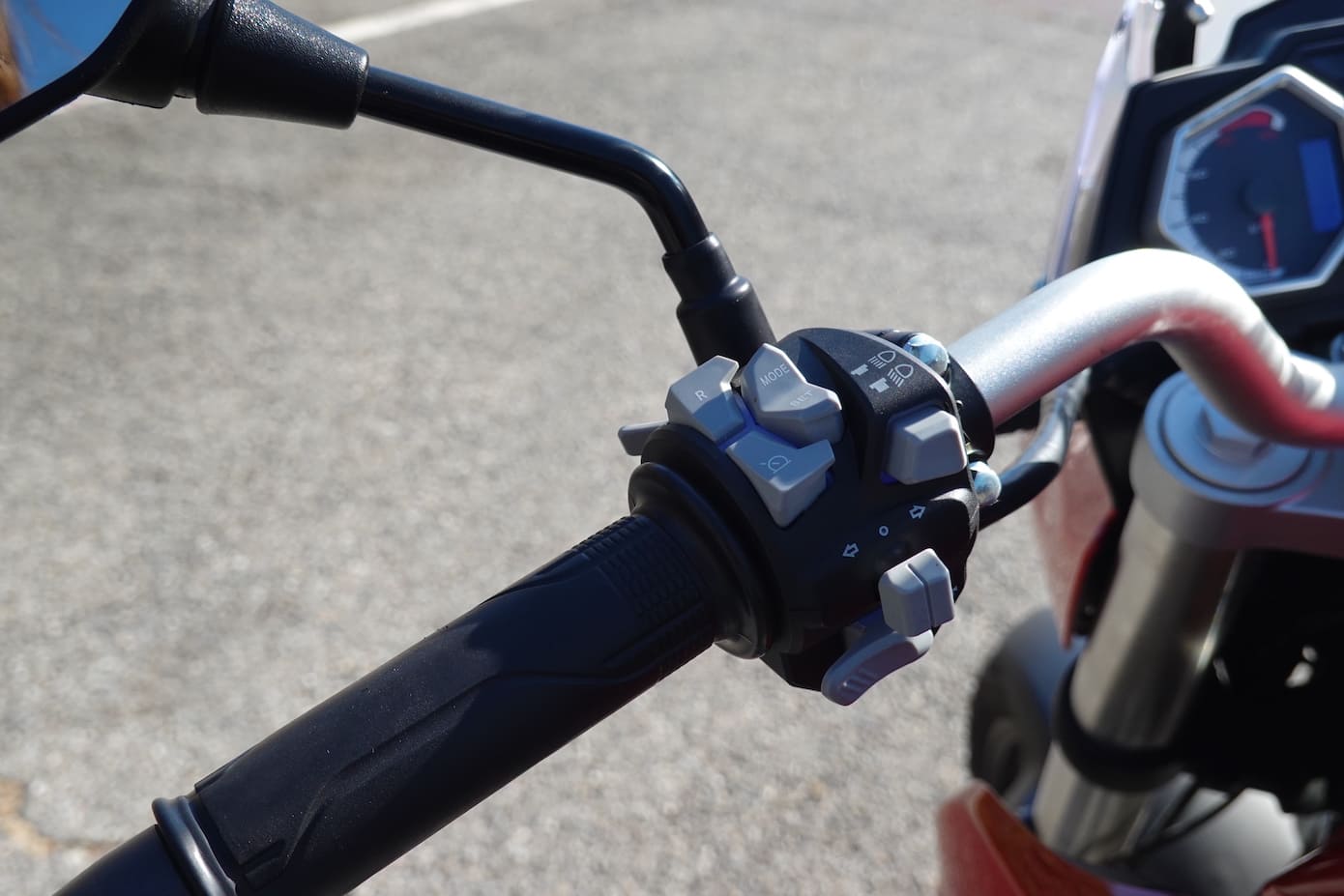
As far as range goes, the bike has a claimed 112 mile NEDC range, but CSC will tell you right away that the real-world range is closer to 80 miles with mixed riding. If you’re on the freeway the entire time, you’ll of course get less. But if you’re doing 30 mph around town, you might even get more.
When it comes time to recharge, you unfortunately don’t have a J-1772 charge port. That means you can’t use public charging stations when you’re out and about. Instead, the CSC RX1E comes with a charger not unlike an electric bike or Sur Ron, just a bit bigger. You plug it into a normal wall outlet in your garage and the other end goes into the bike.
With over 6 kWh, the battery is too big to be removable. A removable battery is nice for apartment dwellers that don’t have ground-level outlets for recharging, but they don’t make much sense past 4-5 kWh. At that point you’d be trying to muscle a 60+ pound battery around. But with 50% more battery (and thus 50% more range) than bikes like the SONDORS Metacycle, the lack of a removable battery is simply the price you pay for more range.
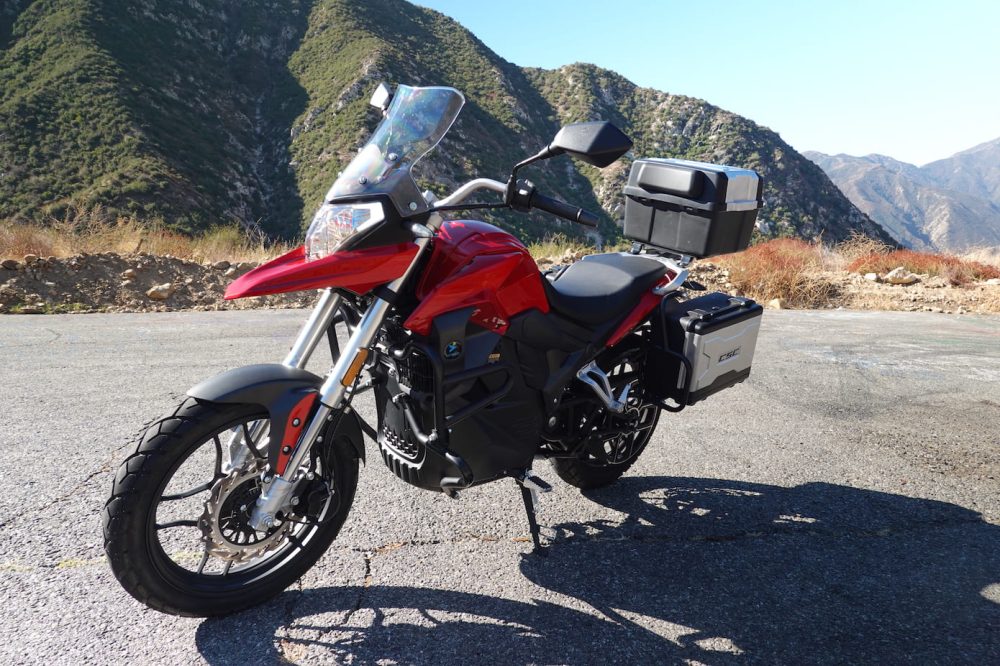
So much value
Compared to the competition, the CSC RX1E comes in at around the same ballpark. It’s around $1k more than a Metacycle but goes 50% further. It’s comparable to a Ryvid Anthem but again, goes further (even if it can’t compete with the awesome look of the Anthem). And its about $4k less than a comparable entry-level Zero motorcycle with similar specs, despite coming with several features not found on those bikes.
Just look at what you get. The bike comes with anti-lock brakes in the front and rear, which many low-cost electric motorcycles skip out on. There’s a small radiator to liquid-cool the motor and controller, letting you push the bike harder than air-cooled alternatives. And then, there’s those included accessories like the storage boxes, bash guards, and windshield. Oh yea, and don’t forget the reverse gear. Not even a $22k Energica has that, and the $25k Zero DSR/X I rode recently only JUST added a reverse feature. The CSC RX1E’s reverse is much easier to use though. It’s a single physical button on the bars, unlike Zero’s reverse gear which requires navigating several clicks through the bike’s on-screen menu.
The only downside here that I can reasonably see is the lack of a local dealership network. But even with that, CSC goes pretty far toward negating the issue entirely. I’ve toured their parts warehouse in California and it is absolutely massive. They sell mostly Chinese imported motorcycles, with the RX1E being no different. But they don’t bring in bikes without also bringing in a huge supply of spare parts for everything. If you ever have a problem, they will have a replacement part out to you by Fedex in a day or two.
I even had the chance to test that a few years ago when I got a City Slicker that eventually had an issue with its rear pulley bearing. They sent me a new pulley immediately and the lead mechanic talked me through the replacement process over the phone. I probably could have just taken it to a shop, but doing it myself helped me learn the motorcycle better. Also it helped that the City Slicker was so light that I could just gently lay it on its side instead of needing a motorcycle lift.
Anyway, the point is that CSC has proven that they’re there to take care of issues if they ever arrive, and that helps give me back most of the confidence that I’d normally get from having a local dealer nearby.
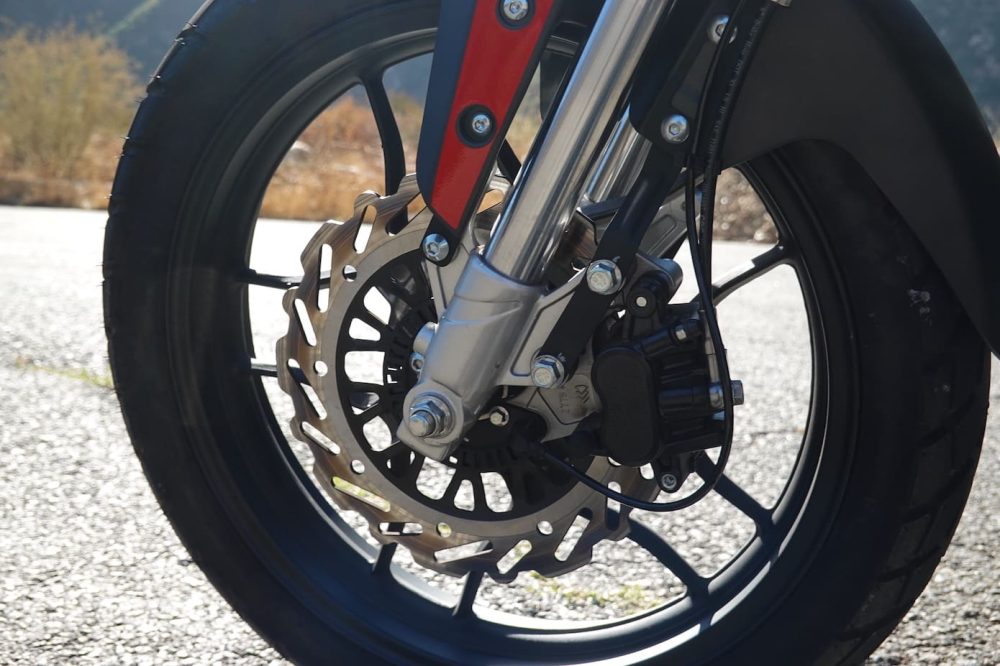
Summing it up
Alright, it’s about time to bring this first-ride review to a close. Basically, my takeaway from this test ride is that the RX1E is punching way above its weight class, which is ironic because it’s actually kind of a heavy bike (465 pounds) that feels much lighter than it really is.
I did a mixture of city riding and canyon carving, and the bike excelled at both. In fact, it was so comfortable and easy to ride that I was actually pushing much harder in the canyon turns than I normally do. The bike carries its weight low and feels so responsive that I just had more confidence pushing myself more than usual.
For pleasure riding, it was a blast. For utility riding, it was a dream. It’s fast. It’s peppy. It’s fun. It has the gear I want and the features I need. I wouldn’t mind if it were $1,000 cheaper, but I can’t even say that it isn’t worth it. Dollar for dollar, it comes in at higher value than nearly any other electric motorcycle I know of.
If you’re looking for a starter electric motorcycle that won’t break the bank, this very well could be it.
Subscribe to Electrek on YouTube for exclusive videos and subscribe to the podcast.
Author: Micah Toll
Source: Electrek



